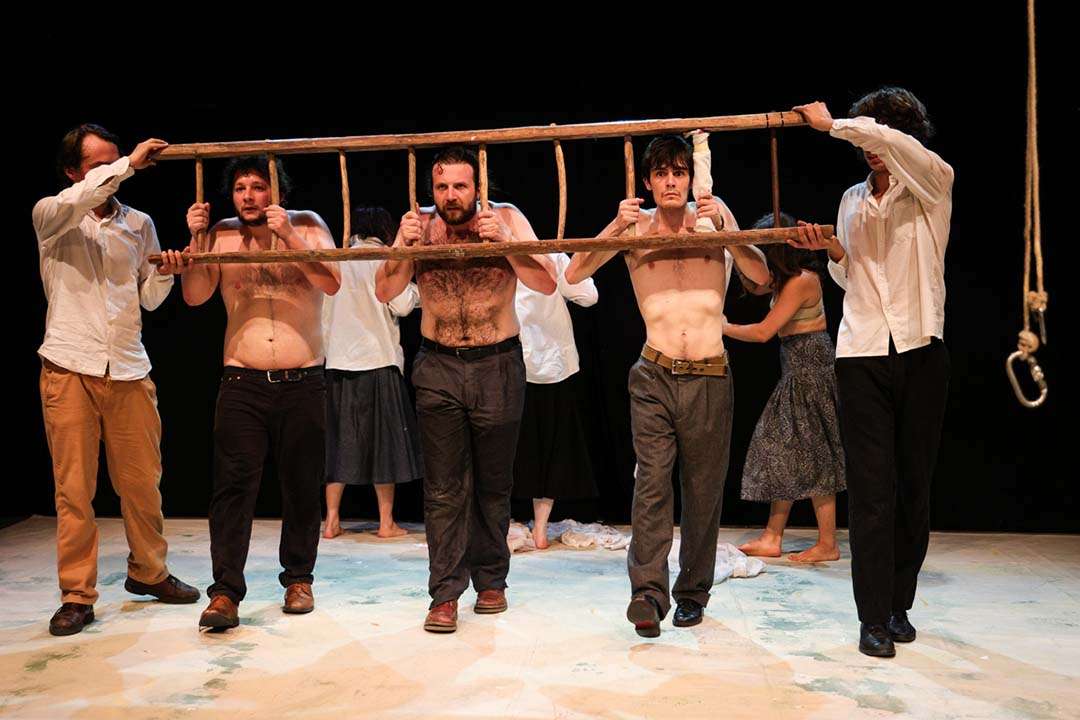Culture in dictatorial regimes: between propaganda and free art is the title of the series of three meetings preceding the performance of King Lear Died in Moscow, the show by Argentine César Brie which on Thursday, December 19 at the Teatro Sociale will open the Altri Percorsi series of the Donizetti Theatre Foundation. «King Lear Died in Moscow is a precious show from a theatrical point of view and of great civil reflection. Eight young artists led by Argentine director César Brie, including Michelangelo Nervosi, one of the boys from our Progetto Young, narrate on stage the story of the Jewish theater Goset founded in Moscow in 1919 by director Aleksandr Granovsky and painter-scenographer Marc Chagall. A theater admired by Gordon Craig, which Stalin destroyed by assassinating the actor-directors who led it, Solomon Mikhoels and Veniamin Zuskin. In the show, historical truth intertwines with the imaginative ability to transform simple objects, rhythms, movements, dances, and choirs into a surprising fresco of humanity», says Maria Grazia Panigada, Artistic Director of the Prose Season and Altri Percorsi. «King Lear Died in Moscow shows how dictatorial regimes, in this case, Stalin’s, fear freedom», continues Panigada, «In the meetings, curated by experts in the individual sectors, a reflection on artistic languages – cinema, music, and visual arts – during dictatorships will be proposed, with the aim of offering historical knowledge, but also providing tools for decoding and understanding the languages and messages they can convey». Organized in collaboration with ISREC – Bergamasque Institute for the History of the Resistance and Contemporary Age, the meetings will all take place at 6:00 PM in the “M. Tremaglia” Music Hall of the Donizetti Theatre with free admission by reservation at the EventBrite links provided on the theater’s website. It starts on Wednesday, December 4 with “ Art at the service of the regime. The regime at the service of art. Continuity and discontinuity of cinema between fascist propaganda and the immediate post-war period”, a meeting curated by Isrec with the participation of Luciana Bramati (Isrec) and Giorgio Giovanetti (Ferruccio Parri National Institute). In this first meeting, it will be reconstructed – through period materials – how fascism bent cinematographic art into a powerful propaganda tool, but at the same time how cinema took its revenge by raising a generation of authors who gave shape to the neorealism revolution. Exemplary is the case of Roberto Rossellini, author between 1941 and 1943 of the so-called Trilogy of Fascist War and then of Rome, Open City in 1945, which will be presented and analyzed. Wednesday, December 11 will be dedicated to music, with On the notes of a song. The cases of the “Song of the Deported”, Frida Misul’s “Sad Songs” and “The Wind Whistles” . Relatori: Elisabetta Ruffini e Angelo Bendotti di Isrec. Nel corso dell’incontro si considererà quanto la musica possa approfondire lo studio della vita all’interno dei lager nazisti, sia dalla prospettiva dei carcerieri che da quella delle vittime. Da una parte l’uso delle orchestre nei lager, voluto dalle SS, metterà a fuoco il ritmo imposto alle prigioniere e ai prigionieri; dall’altro l’analisi di alcuni casi specifici – Il canto dei deportati e le Canzoni tristi di Frida Misul – aiuterà a considerare come la musica possa contribuire alla conoscenza di cosa sia stata la resistenza dentro i lager. A seguire si parlerà di due notissimi canti, Fischia il vento e Bella ciao, per riflettere su quanto la musica possa diventare elemento di identità e aggregazione e segnare poi la memoria della stessa Resistenza. Infine, mercoledì 18 dicembre, si affronterà il tema Arte e regime. La potenza dell’estetica con Maria Grazia Recanati del Politecnico delle Arti di Bergamo – Accademia Carrara di Belle Arti. Sotto la lente di ingrandimento saranno i delicati rapporti dell’arte con il potere, in senso di compromesso, dissenso, collaborazione. Il XX secolo ha registrato in particolare due episodi storicamente molto significativi: i due regimi totalitari della Germania nazista e dell’Unione sovietica comunista. Quali sono stati gli atteggiamenti degli artisti nei confronti di questi regimi al loro presentarsi? Come hanno reagito i due regimi alle nuove ricerche artistiche che le avanguardie storiche presentavano? Da un lato molti artisti si sono schierati, pagando prezzi molto alti, contro le ideologie. Da un altro si sono posti al servizio del regime. Dal canto loro i detentori del potere non hanno mancato di usare la suggestione estetica a scopo di propaganda. Nasce da questa dialettica una questione fondamentale: cosa l’arte abbia a che fare con la morale e la libertà dell’uomo, quale sia il potere dell’arte nella suggestione e nella creazione di un’estetica di regime, che oggi gli studi più recenti tendono a recuperare nei suoi valori puramente artistici. LINK PER PRENOTAZIONI Mercoledì 4 dicembre, ore 18.00 ART AT THE SERVICE OF THE REGIME. THE REGIME AT THE SERVICE OF ART https://www.eventbrite.it/e/larte-al-servizio-del-regime-il-regime-al-servizio-dellarte-tickets-1086837804129?aff=oddtdtcreator Wednesday, December 11, 6:00 PM ON THE NOTES OF A SONG https://www.eventbrite.it/e/sulle-note-di-una-canzone-tickets-1086844514199?aff=oddtdtcreator Wednesday, December 18, 6:00 PM ART AND REGIME https://www.eventbrite.it/e/arte-e-regime-tickets-1086846439959?aff=oddtdtcreator





